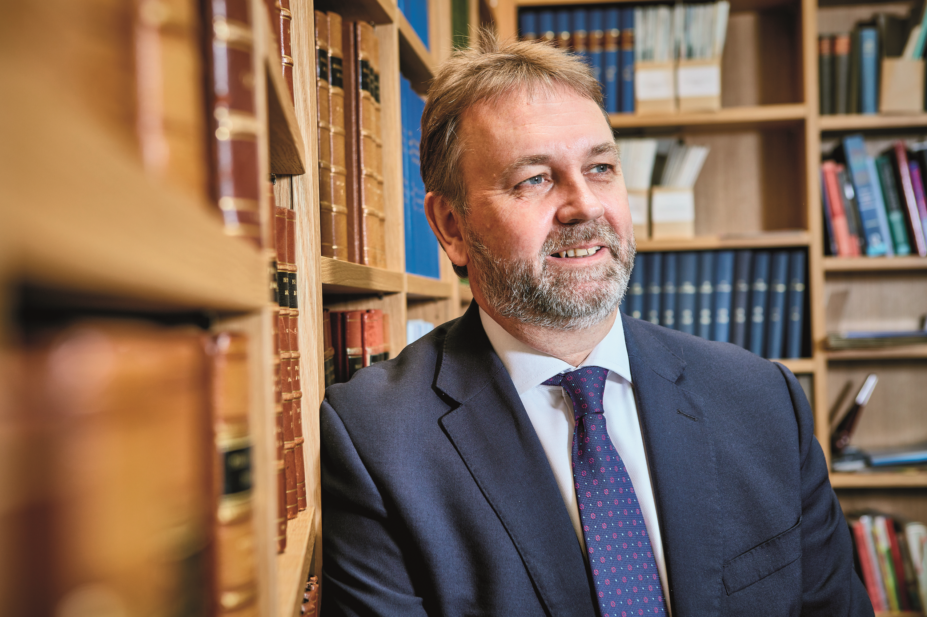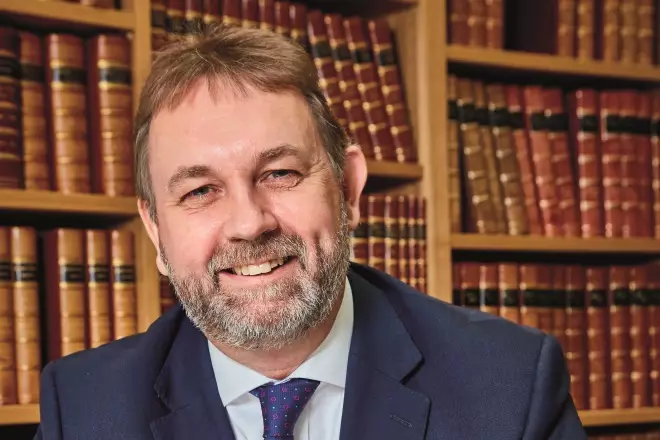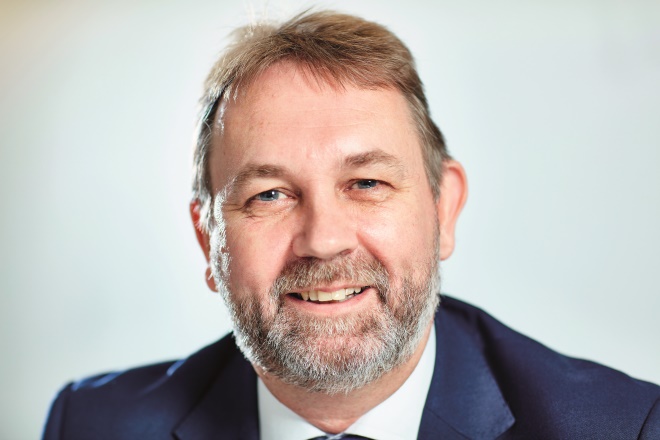
Dave Phillips
Paul Bennett joined the Royal Pharmaceutical Society (RPS) as chief executive in July 2017. Immediately prior to joining the Society, Bennett was chief officer of the Hampshire and Isle of Wight local pharmaceutical committee, and his previous roles have included professional standards director and superintendent pharmacist at Boots UK and chair of the National Pharmacy Association.
During his first few weeks in office, Bennett told The Pharmaceutical Journal that “connecting with members at speed is … probably my highest priority”. One year on, he reflects on a major restructure of the RPS Executive team, the recent pharmacy board elections and the Society’s international ambitions.
What’s the biggest change to have happened in the 12 months you’ve been here?
Probably the single biggest change has been the implementation of the business plan for 2018. We recognised that we needed to sharpen our approach to business planning, so in November 2017 my team and I took a budget proposal to the RPS Assembly calling for more investment. The proposal was approved and allows us to focus on six key themes: technology; revalidation; influence; brand; engagement; and people. Making sure that those key things have been captured has helped bring focus to 2018.
The second aspect, much more latterly, has been a restructure of the Executive team and how that sets us up for 2019.
Why has the Executive team been restructured and what tangible outcomes will members see as a consequence?
When I joined the organisation, it was clear that there was a desire from our colleagues for the organisation to work in a more efficient way. Consequently, in May 2018 I announced internally to my colleagues that we would be restructuring the Executive team, and we implemented that structural change in July 2018. The restructure is designed to take down barriers and make decision-making simpler and swifter. It also brings some clarity to the functions that I think are important to the organisation, which are focused around four key priorities: our members, first and foremost; our staff; our science and research agenda; and our educational agenda. We now have a functional structure that supports those priorities.
Harvey Sondh is now our director of innovation and enterprise: he’s moved from our publishing business to take that role on. That’s very exciting because it’s a new way for the Society to think and operate: how do we take an idea from inception, develop it and then ultimately take it to an operational state? Jeremy Macdonald has also moved from publishing to take on a Society-wide director of technology role. It is increasingly important that, if you have a product or service, you have a technological approach — this brings better access for the consumer.
Alina Lourie continues to lead as managing director of the publishing business, which is going from strength to strength. We have the functional supporting areas of finance and corporate services under Simon Redman, while Helen Gray is head of people.
It’s really important that the Society reaffirms the place that science and research has in this organisation
One of the biggest changes is Robbie Turner taking up the new role of director of pharmacy and member experience. That’s a huge role bringing together many of the functions that were already in place to support our members and enhance their experience with the Society, but that were dissipated across several different directorates. Five different directorate functional areas have come together in Turner’s role, including events, professional support, marketing and communications, as well as the functions of the three country teams led by Mair Davies (director of Wales), Alex MacKinnon (director of Scotland) and now Ravi Sharma, who will be joining us as director of England in November 2018. Wherever a member experiences the Society, now it all comes under the leadership of one director. I’m very optimistic that this is going to improve the member experience.
We appointed Gino Martini as chief scientist, looking after science and research. It’s really important that the Society reaffirms the place that science and research has in this organisation. The pace and rate of change in pharmaceutical science is astounding, so we need very strong and competent advice and I’m confident we’ve got that.
As director of education we’ve recruited Gail Fleming, who comes from Health Education England where she was one of the deans of pharmacy. Fleming will have the remit to develop the full educational strategy: prefoundation, foundation and advanced practice. Her responsibilities include the Faculty and the development of the international educational offer, working closely with Sondh. We’re doing a lot of work on the Foundation programme at the moment, with encouragement and support from the four chief pharmaceutical officers of the UK.

Source: Dave Phillips
Can you tell us more about the work on the Foundation programme?
As chair of the Faculty and education board, Peter Kopelman has been leading a task and finish group that has made a series of proposals around what a national foundation training programme for pharmacists could look like. This work has got very strong support, not least from the four chief pharmaceutical officers of the UK. We’re now pursuing each of the proposed activities, part of which was to form a governance and oversight board. A subgroup of the task and finish group has also been formed, which professor Ian Bates, the Society’s education adviser, is chairing. He and the education team will be looking at the curricula for the Foundation programme, building on the extensive work that we’ve got already. He’s working with partners on that and making recommendations to the Faculty and education board. It’s big and it’s very important to the future of the pharmacy profession.
What else have you been working on over the past year?
I’m delighted that the Society has the opportunity to host the International Pharmaceutical Federation (FIP) congress in Glasgow in September 2018 and we’ve focused a lot of time and attention on that. Glasgow is a fantastic location and the programme looks very exciting. It’s looking like we’re going to have a record number of UK delegates, and I’m hearing that we have very strong numbers already registered to attend as a whole. The RPS is hosting the welcoming ceremony and a pharmacy in Great Britain session. There’s also, for the first time, an event taking place just prior to the commencement of FIP to which chief pharmaceutical officers (CPOs) across the world are invited. This is being coordinated by the RPS and will be chaired by Rose Marie Parr, Scotland’s CPO, which makes a big statement that Scotland is taking a lead in pharmacy. I hope there will be a commitment to collaborate on some of the big issues and challenges facing us: access to essential medicines would be one example. But I don’t want to prejudge what the CPOs themselves will identify as key themes to focus on.
Our work on revalidation supports our ethos around lifelong learning — the opportunity to capture and retain your CPD
Revalidation has been another major activity; making sure that our members and all registrants are supported as the revalidation process is introduced. I understand that we’ve hosted more face-to-face events than any other organisation to help build awareness among registrants of what the revalidation requirements are in 2018 and how this will change in subsequent years. To help with continuing professional development (CPD), we’ve produced high-quality content through The Pharmaceutical Journal. And, of course, we’ve developed an app and a platform-based mechanism by which you can record your CPD, ready to submit to the General Pharmaceutical Council. This all supports our ethos around lifelong learning — the opportunity to capture and retain your CPD. That’s important because I understand that those who could provide similar facilities are not committing to that, whereas the Society is. I am using the Society’s revalidation platform to capture my own CPD and will use this when the time comes to submit my own revalidation evidence.
There’s an awful lot of opportunity around global leadership in the safe and effective use of medicines, but we need to do a bit more discovery around what that opportunity can look like. We have a strong reputation internationally and many organisations akin to our own are keen to work with us. We have memorandums of understanding with organisations in Japan, Australia, Iceland and, more recently, in some of the Arab states. There’s opportunity for us to work even more closely together. Through the creation of the new directorate and the innovation and enterprise role that picks up responsibility for international strategy, we can create the space and capacity to do within the organisation what we haven’t been able to before.
We’ve still got work to do around our governance. We have introduced a two-phase approach to reviewing the governance of the organisation, phase one of which has been completed. That was largely a desktop exercise to tidy up some of the arrangements that were in place and was approved and supported unanimously by the Assembly in March 2018. We are now in phase two and the end output of that will be to make our governance arrangements clearer for people to understand, so it will be easier to do business within the organisation. We still have work to do on making the organisation slicker in getting from a great idea to swift implementation. We should try things and not be afraid of them failing. Some things will fail, but the trick is to fail quickly and cheaply so that resource can be devoted to initiatives that are successful and bring real benefit to the organisation and its members.
Does more still need to be done to encourage members to engage with national pharmacy board elections?
I was really pleased by the positive response to the board election in Wales — it demonstrates that greater engagement with members encourages people to interact with, and want to be part of, the Society. One of the best ways to be part of the Society is working with the national pharmacy boards, whether it’s standing for election or voting for a member who resonates with you; however you do it, it’s important that you participate.
One of the best ways to be part of the Society is working with the boards, whether it’s standing for election or voting for a member who resonates with you
We’ve got a lot more work to do but I’m really encouraged by the work we’ve been doing on our branding and proposition; I think that will encourage people to want to participate more as we demonstrate our relevance to our members and their lives.

Source: Dave Phillips
You previously said you were disappointed by some of the behaviours exhibited by a small number of members of the Society during the 2018 election campaign. Is the Society looking into this?
We were unhappy about some of the activities that were observed, which members brought to my attention and to the attention of the team. We took those very seriously. In order to be able to address that, we need to enhance our governance arrangements. We are actively looking at that as part of the work we are doing under phase two of the governance review.
What is the RPS doing to reassure pharmacists around the Falsified Medicines Directive?
Our role is to provide guidance and support around the professional aspects of the introduction of the Falsified Medicines Directive (FMD), not around the implementation of it. That is for others who are frankly better placed to do that. But we are doing some work on the FMD and we will be developing further guidance to add to what we’ve already produced because we recognise that there will be some professional challenges associated with the implementation of the FMD. I’m mindful that there are still many unanswered questions and we are as keen as everyone else to understand what the answers to those questions are, and we will support the communication of that.
What are your final reflections on your first 12 months in office?
I have been most impressed with how passionate many of our members are about the profession of pharmacy. It’s a real delight and privilege to spend time with people — particularly with some of our expert advisory groups — who are dealing with patients, advancing the profession through research, or are involved in scientific developments. Listening to them speak with such conviction about the importance of the profession and the difference that pharmacy makes to the health and welfare of the public is really inspiring.
That’s probably the most enjoyable aspect of being chief executive: the opportunity to interact with passionate and professional individuals who are members of their professional leadership body. And who believe as strongly as I do that the profession has a strong and vibrant future.
You may also be interested in
Long service of members

Membership fees 2022
